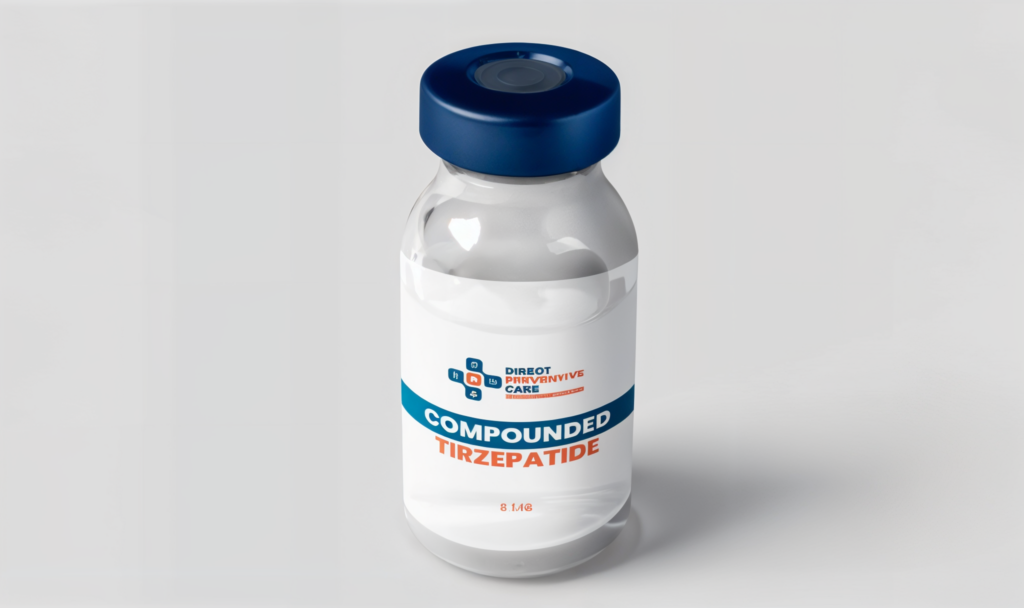
Does Mounjaro or Compounded Tirzepatide Cause Headaches?
Tirzepatide is a commonly injected medication for treating Type 2 diabetes. It works to lower hemoglobin A1C, a primary indication of long-term blood sugar level management. Similar to any prescription medication, however, Tirzepatide can cause certain side effects. Although typical effects include nausea, diarrhea, vomiting, and diminished appetite, several users have likewise reported headaches. The question looms—does Tirzepatide contribute to headaches?
It is essential to know the possible reasons behind the headaches, especially for individuals who are considering Compounded Tirzepatide as an alternative when it comes to diabetes management. Even though there are no direct reasons linking Tirzepatide to headaches, there are several indirect reasons behind them. This blog gives the possible reasons, prevention measures, and possible alternative medications of headaches in the event of taking Tirzepatide.
How Tirzepatide Functions in the Body?
In order to comprehend how Tirzepatide may lead to headaches, it is important to understand how it functions. Tirzepatide is a novel class of drug that belongs to the dual glucose-dependent insulinotropic polypeptide (GIP) and glucagon-like peptide-1 (GLP-1) receptor agonists. Unlike other drugs for diabetes, Tirzepatide mimics the effect of both GIP and GLP-1 hormones in the body. These gut hormones regulate blood sugar and appetite.
Tirzepatide functions primarily by:
- Enhancing insulin secretion
- Enhancing the body’s sensitivity to insulin
- Suppressing hunger and prolonging satiation
- Reducing gastric emptying to regulate blood glucose level
While these actions facilitate better diabetes control, they may also produce side effects like headaches, which may arise due to changes in hydration status, blood sugar fluctuation, or other underlying causes.

Can Tirzepatide Cause Headaches?
Currently, there is no immediate clinical correlation of headaches with Tirzepatide. However, there are cases that have been reported, whose incidence is likely indirect through the causation of:
1. Low Blood Sugar Levels (Hypoglycemia)
Tirzepatide is effective in lowering blood sugar, but under some circumstances, it may induce hypoglycemia—especially when taken with other diabetes medications like insulin or sulfonylureas. When blood sugar is low, dizziness, sweating, weakness, and headaches are among the symptoms. If left untreated, hypoglycemia can become dangerous, so it is crucial that patients monitor their glucose levels often.
2. Dehydration
One of the more common side effects of Tirzepatide is reduced appetite, resulting in people eating and drinking less. The medication also retards digestion, which sometimes brings on nausea and vomiting, again resulting in dehydration. Dehydration headaches typically feel like a tight band around the head, and in some cases, can even trigger migraines. Adequate hydration is crucial to reducing this risk.
3. Gastrointestinal Side Effects
Tirzepatide slows down the emptying of the stomach, leading to bloating, nausea, or vomiting in a few instances. This indirectly leads to headaches due to dehydration or body stress.
4. Hyper-Sensitivity to Hormonal Response
Tirzepatide influences hormones within the intestine that regulate blood sugar and metabolism. Some are more sensitive to these hormonal changes, which lead to headaches when the body adjusts to the drug.
5. Sleep Disturbances
Some people might experience slight disturbances in sleep at the time of Tirzepatide initiation. Poor sleep quality or disturbed sleep can result in headaches, particularly when therapy is recent.
The Impact of Alcohol on Consumers of Tirzepatide
Although no interaction between alcohol and Tirzepatide is known, the consumption of alcohol at the time of consumption of this drug can increase its side effects and increase the possibility of headaches.
This is the way alcohol might lead to headaches:
- Dehydration: Alcohol is a diuretic, which results in urination and fluid loss, thus aggravating dehydration and leading to headaches.
- Hypoglycemia: Alcohol tends to decrease blood sugar levels, especially when consumed on an empty stomach, increasing the risk of hypoglycemia-induced headaches.
In patients receiving Compounded Tirzepatide, moderation of alcohol intake can avoid these side effects.

Prevention and Treatment of Tirzepatide-Induced Headaches
If you get headaches after you take Tirzepatide, there are certain steps that you can take to reduce discomfort and prevent recurrence.
1. Stay Hydrated
Staying hydrated with water throughout the day can prevent dehydration headaches. Having a refillable water bottle and reminders to drink can help you stay hydrated.
2. Monitor Blood Sugar Levels
Regular monitoring of blood sugar will help identify any hypoglycemia headache in its early stage. If the blood sugar becomes too low, consuming a rapid-acting carbohydrate such as glucose tablets or fruit juice will correct the imbalance.
3. Adapt Meal Habits
Eating small, balanced meals can help manage nausea and maintain stable blood sugars. Fiber, protein, and healthy fat-containing diets provide stable glucose control and reduce the likelihood of blood sugar swings that may cause headache. Reducing large food intervals also maintains stable glucose levels.
4. Get Enough Sleep
Inadequate sleep may make headaches worse, particularly in the case of medication-induced altered metabolism. Consistent sleep timing, creating a calming pre-sleep routine, and avoiding screen use before going to bed can help improve sleep quality. If the headaches persist in spite of sleep issues, coordinating potential changes with a healthcare provider may be useful.
5. Take Over-the-Counter Pain Relievers
If the headaches recur, take over-the-counter pain medications like acetaminophen or ibuprofen. But first, it is always wise to visit a doctor for advice before taking any new medication, particularly when you already have conditions like kidney disease or gastrointestinal issues.
6. Limit Alcohol Consumption
Avoiding or limiting alcohol can help avoid dehydration and blood sugar fluctuations, reducing the risk of headaches. If you do drink alcohol, consume large amounts of water and have food with it to minimize side effects.
7. Gradually Adjust Doses
If headaches are an ongoing issue with Tirzepatide, discussing a change in dose with a medical provider can be helpful. Some users find they have fewer side effects by beginning with a low dose and titrating up.
When to Call a Doctor
While simple lifestyle modifications can sometimes resolve mild headaches, severe or frequent headaches can be a sign of an underlying condition that will need to be treated. Seek immediate care if you experience:
- Long-standing, debilitating headaches that are not relieved by water or medication
- Severe vomiting or nausea that prevents the intake of fluids
- Signs of extremely low blood sugar levels, such as confusion, blurred vision, or loss of consciousness
- Headaches with attendant neurological signs including alterations in vision, dizziness, or weakness
In cases where headache is affecting daily activity, it would be useful to consult a doctor about other options for treatment including Compounded Tirzepatide.
Exploring Compounded Tirzepatide for Diabetes Management
For individuals looking for an alternative to traditional Tirzepatide injections, Compounded Tirzepatide may be a viable option. Compounded Tirzepatide offers customized formulations that cater to specific patient needs, potentially reducing side effects while maintaining efficacy in blood sugar control.
At Direct Preventive Care, we provide high-quality Compounded Tirzepatide tailored to support diabetes management. If you are experiencing side effects from standard Tirzepatide, consult with our healthcare professionals to explore customized treatment options.
Final Thoughts
While Tirzepatide is not directly linked to headaches, various factors such as low blood sugar, dehydration, gastrointestinal discomfort, hormonal changes, and sleep disruptions may contribute to them. Understanding these potential triggers can help individuals take proactive steps to prevent and manage headaches effectively.
Staying hydrated, maintaining balanced blood sugar levels, adjusting meal patterns, ensuring sufficient sleep, and monitoring alcohol intake are key strategies to minimize headaches. If symptoms persist, seeking medical advice and considering alternative formulations such as Compounded Tirzepatide can offer personalized diabetes management solutions.
For those navigating diabetes treatment, understanding how medications affect the body is essential. Direct Preventive Care is here to provide expert guidance and customized solutions for optimal diabetes management. Reach out today to learn more about Compounded Tirzepatide and how it can support your health journey!














